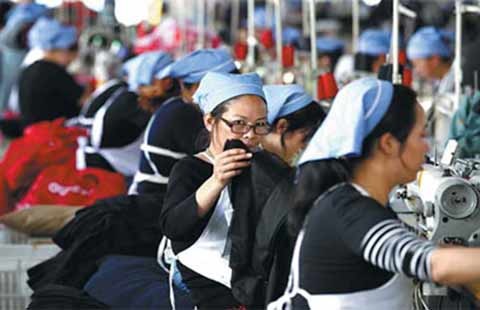Men to wives: Earn more, but still less than I do
By Cheng Yingqi (China Daily) Updated: 2013-01-08 01:15A growing number of men expect their wives to earn more money, but not more than they do, a survey has found.
The findings, analysts said, reflect the rising cost of living in China and the increasing role women play as breadwinners.
 |
|
A couple enjoy a light moment in the snow at a university campus in Beijing in December. [Photo/China Daily] |
On Monday, the Social Sciences Academic Press published the Annual Report on Social Mentality in China 2012-13, which included a research report on the criteria that people use to choose a spouse.
Less than 1 percent of male participants said they hope their future spouses will earn more than they do, while the ratio of men expecting to find a wife who makes as much as men increased from 18.3 percent in 2005 to 25.7 percent in 2010.
Meanwhile, women's income expectations for their spouses did not show any notable trends. Forty-four percent of the female respondents said they believe their husbands should earn more money than they do.
"In general, women set higher requirements for men's incomes. But with fast social development, the cost of forming and supporting a family is increasing, so the new trend for most families is that men are no longer the only breadwinners," said Zhang Zhen, one of the writers of the report and a researcher at the Institute of Psychology of the Chinese Academy of Sciences.
Similarly, the age gap accepted by men and women has changed with the changing role of husbands and wives.
In the report, women respondents generally said they want to marry men older than them, but the anticipated age difference between men and women has narrowed in recent years.
In 2005, the average age difference accepted by women was 4.14 to 12.58 years, while in 2010 it was 1.1 to 8.47 years. Men accepted women 5.24 years younger to 0.99 years older than them in 2010.
The report was jointly conducted by the institute and the online dating website Baihe.com. More than 35,000 randomly selected users participated in the survey, and the analysis was based on 31,435 respondents between the ages of 18 and 40.
"People's criteria in choosing a partner is related to the way they behave in marriage, and thus has an influence on social issues such as the divorce rate. Since online dating is so popular among the younger generation, we chose to study the psychology of online dating website users to reflect trends in love and marriage," Zhang said.
Han Shuang, 30, who met her husband through the online dating website Jiayuan.com, said she does not care much about her spouse's income.
"I have a job that pays well, so when I chose a husband I did not care how much he earned. My only requirement was that I expected him to have a stable job, so that the family income would be secure," Han said.
"I know some women may want to marry men who are really good at making money, but I think most of these women have lower incomes themselves, so they hope to find a solution through marriage.
"In my case, my husband and I enjoy more financial equality in our marriage."
According to a research report recently published by Jiayuan.com, women are becoming more financially independent. Thirty-nine percent of women refuse to become housewives after getting married, and 98 percent said they would not ask their husbands to hand over their wages.
Wang Siran, a relationship adviser for Jiayuan.com, said the changing attitude toward marriage is part of a bigger change in society.
"In the 1970s, intellectual elites had a higher social status, so educational background was given more importance in choosing a spouse. A priority was placed on income from the 1980s to the 1990s amid the fast economic growth.
"The new trend shows the awakening of female self-consciousness. More men and more women believe that women can play a larger role in family economics."
- Nation's next generation of missiles to be highly flexible
- Organ harvesting rumors slammed
- International trade corridor tested
- China's organ donation cases rise 45 percent in H1 of 2016
- Li urges top advisers to rely on broad vision
- China to strengthen regulation on real estate agencies
- Beijing garrison gets a new commander
- Diplomats vow progress on code of conduct
- Volunteers help fellow expats stay within law
- Heart disease rising; lifestyle shift blamed










